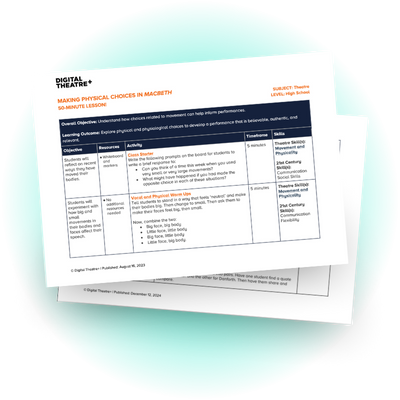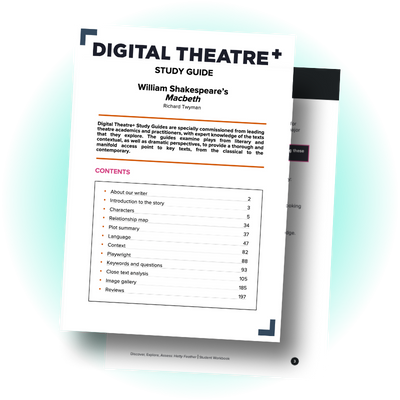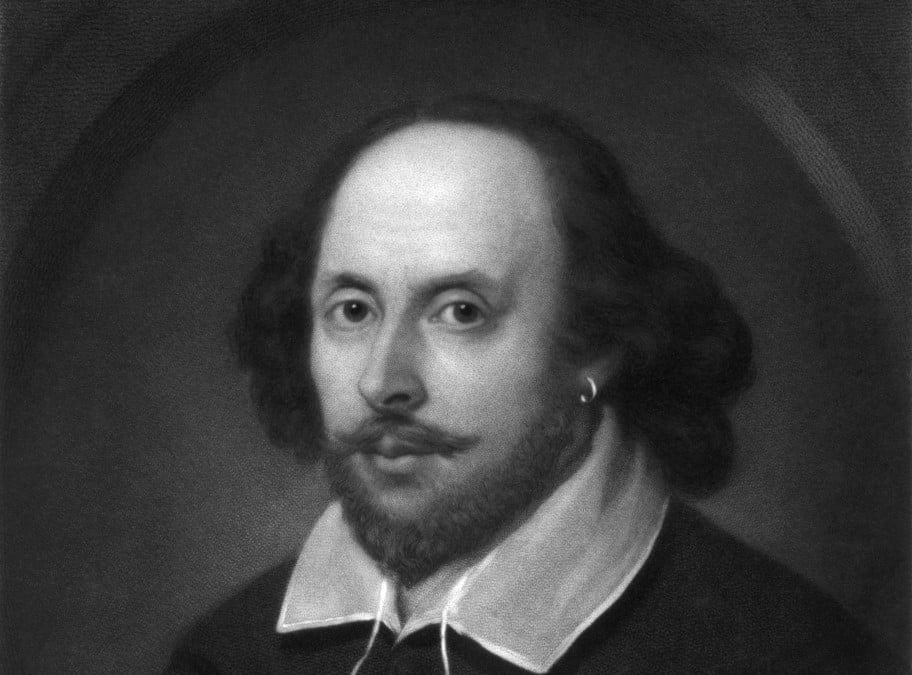Teach Macbeth
Written and first performed in 1606, Macbeth is William Shakespeare's shortest tragedy, telling a gripping story of power, ambition, witchcraft, and murder...
Digital Theatre+ helps you bring Macbeth to life in the classroom with high-quality productions, lesson plans, interactive resources, and more...
Macbeth | Donmar © Marc Brenner
Explore Macbeth on Digital Theatre+
- 7Productions
- 70Video resources
- 60Written resources
Light up your classroom with engaging resources made by teachers, for teachers. Get in touch for a complete overview.
|
|
Digital Theatre+, 2011 Directed by Gemma Bodinetz, Digital Theatre captured this production live in Liverpool. It stars Everyman Youth Theatre alumnus David Morrissey in the title role, opposite Julia Ford as Lady Macbeth. "In Bodinetz's striking production, tinged with the sense of things intangible, Shakespeare's disturbing combination of warring soldiers and "weird sisters" becomes chillingly plausible." – The Guardian |
|
|
Illuminations & the RSC, 2003 The Royal Shakespeare Company's Macbeth, starring Antony Sher and Harriet Walter was captured at the Roundhouse in London. Set in a labyrinth of dimly lit tunnels, director Gregory Doran brings his original sell-out show to life using candid filming techniques that evoke themes of terror and brutality in this modern-dress performance. "Stratford has come up with its best Macbeth since Trevor Nunn's legendary production a quarter of a century ago!" – The Guardian ★★★★★ |
|
|
RSC, 2018 Shakespeare's tragic tale of murder, manipulation, and witchcraft is brought to life in this contemporary production which marks both Christopher Eccleston's RSC debut, and the return of Niamh Cusack to the Company. This production was captured live in Stratford-upon-Avon. "With its witches, macabre slayings and existential despair, Macbeth suits the film noir makeover of director Polly Findlay's thrilling take." – Time Out ★★★★ |
|
|
Stratford Festival, 2016 Shakespeare's tale of a kingdom gained and lost unfolds in this Stratford Festival production, in which the Scottish throne changes hands with ever-increasing violence. Filmed live at the festival in 2016, Ian Lake and Krystin Pellerin bring to life one of literature's most infamous marriages, while Michael Blake takes on the role of Macduff. "The first truly satisfying, large-scale Macbeth I've ever seen: taut, thrilling, and at times, terrifying." – The Globe & Mail |
|
|
English Touring Theatre, 2024 Captured live at the Bristol Old Vic in 2024, the English Touring Theatre's modern production was praised for its creative use of technology, including video projection, and its unique portrayal of the Witches. Directed by Richard Twyman, this production stars Mike Noble as Macbeth and Laura Elsworthy as Lady Macbeth. "[Mike Noble] conveys the horror of an everyman who is isolated and out of his depth." – The Guardian ★★★ |
|
|
Tara Arts, 2015 Shakespeare's tale of a desperate and destructive folie à deux is brought into the 21st century, complete with three prophesying drag queens, in this Tara Arts production, created in association with Black Theatre Live and Queen's Hall Arts. "This Macbeth is a man who recognised that these [Witches] have tricked him and faces his fate with a calm resignation in a rethinking of the usual ending." – British Theatre Guide |
|
|
L.A. Theatre Works, 2011 Recorded at The Invisible Studios in 2011, this audio performance was adapted for the radio by Martin Jarvis, and stars James Marsters as Macbeth, Joanne Whalley as Lady Macbeth, and Kristoffer Tabori as King Duncan. "Text, performances, and sound all combine to deliver an affecting tale of tragic horror." – AudioFile Magazine |
Interviews & Documentaries
- Harriet Walter on Macbeth
- Antony Sher on Macbeth
- Julia Ford on Lady Macbeth
- On Acting: David Morrissey
E-learning Videos
- Unlocking Character: Macbeth
- Unlocking Structure in Macbeth
- Compare and Contrast: Act 2, Scene 2
Essays
- William Shakespeare at a glance
- Macbeth: A Critical Introduction
Study Guides
- Macbeth
- Unlocked: Macbeth
Teaching Guides
- Discover, Explore, Assess
- Shakespeare in your Space
- Unlocking Tragedy: Teacher Notes
Macbeth Lesson Plans
- Analyzing How Macbeth and Lady Macbeth Interact
- Making Physical Choices in Macbeth
- Understanding Macbeth's Character Development
- Compare and Contrast: Macbeth

What is Macbeth about?
Shakespeare's shortest tragedy follows Macbeth, a highly-regarded army general.
Loosely based on a real king of Scotland (1040-1057), Macbeth is thought to have been first performed in 1606 as a response to the Gunpowder Plot (a failed attempt by a group of Catholic men to blow up Parliament and kill King James I).
Macbeth meets three witches who prophesy his future, and when the first of their three prophecies come true, the power-hungry general and his wife unscrupulously work to ensure the outcome of the remaining two - at any cost.
Explore Key Themes & Characters
Turn passive learning into active engagement with fun and dynamic resources on core literary texts like Macbeth, including in-depth analysis of key themes, characters, and literary techniques. Explore the full DT+ library with a free trial.
In Jacobean society, people felt that kings ruled by divine appointment - in other words, they believed a king was appointed by God.
In Macbeth, the audience would believe that King Duncan was rightfully appointed by God, and therefore, Macbeth's decision to kill the king is no ordinary murder plot: he is well aware that he is destroying the natural order set in place by God.
Gender roles were very strict in 17th century England, which was a patriarchal society. Women were seen as the property of their fathers (and eventually their husbands), and were considered the 'weaker sex'.
Such strict gender expectations harm both women and men in the play. Lady Macbeth is driven mad with guilt and grief (which a Jacobean society would have seen a fitting end to such a ruthless and ambitious woman), while Macbeth clearly sees his masculinity as linked to his ability to perform violent acts.
In Shakespeare's time, you could easily get away with murder if no one had reason to suspect you - and as a result, guilt has an important narrative function. It is used to tell the audience that even if you escape suspicion, you will have to deal with your own conscience.
The impact of guilt is very apparent in both Macbeth and Lady Macbeth after they succeed in murdering King Duncan, and Lady Macbeth's famous line, "Out, damned spot" (Act 5 Scene 1) is thematically tied to the idea of guilt.
Key Characters
"Not in the legions / Of horrid hell can come a devil more damned / In evils to top Macbeth." (Malcolm, Act 4 Scene 3)
The play's protagonist and titular character, Macbeth is not a straightforward villain. He seems to have a conscience, a moral code that he fights against at the start of the play.
Macbeth is ultimately fooled by the witches, and his arrogance proves to be his downfall when he is eventually killed by Macduff.
"Look like the innocent flower, but be the serpent under't." (Lady Macbeth, Act 1 Scene 5)
Macbeth's wife, and a woman of incredible ambition, Lady Macbeth is first introduced to the audience when reading a letter from her husband.
She is heavily involved in her husband's murder of King Duncan, and eventually goes mad with grief and guilt. She sleepwalks, and constantly tries to wash her hands in an attempt to remove Duncan's blood from them.
Eventually, Lady Macbeth throws herself from the castle walls, committing suicide.
"When shall we three meet again? / In thunder, lighting, or in rain?." (First Witch, Act 1 Scene 1)
The witches (also called the 'Wyrd Sisters') are three mysterious, supernatural figures who deliver several prophecies that reveal Macbeth's future.
They saw that Macbeth would become Thane of Cawdor, and eventually King of Scotland, while Banquo's sons would be heirs to the throne.
The prophecies they deliver make Macbeth overconfident and lead to his downfall. It is their predictions that set the events of the play into motion.
Why did Shakespeare write Macbeth?
Shakespeare's theatre company, the King's Men, received patronage from King James I, so it's likely that Shakespeare wanted to make a 'Scottish' play to please his patron.
Shakespeare could also use Macbeth as a way of warning the audience about the terrible consequences of killing a king, which he does is less than subtle ways: King James was thought to be a descendent of Banquo, so the torment Macbeth faces from killing Banquo would be a reminder to the audience to think twice before trying to harm the king.
Free Resources for Macbeth
Unlocking Character: Macbeth | E-Learning Video
Explore the character of Macbeth with this bite-sized e-learning video designed to engage your students and strengthen their understanding of Shakespeare's Macbeth.
Macbeth: Lesson Toolkit
Immerse your students in the world of Macbeth (and save precious planning time) with this ready-to-go 60-minute Lesson Toolkit, designed for your next High School ELA lesson.
New! Donmar Warehouse's Macbeth, now available on DT+
Starring David Tennant and Cush Jumbo, this new production from London's renowned Donmar Warehouse is a powerful way to engage your students with one of Shakespeare’s most studied plays. Watch it now with a free trial of DT+.
- Access to 5+ unique Macbeth productions (including this exciting new version!)
- Thousands of classroom-ready tools to help you create impactful Macbeth lessons
- A range of productions and classroom tools for Shakespeare, and other widely taught texts across English and drama
Fill in the form below to start your free trial and bring Shakespeare to life in your classroom!
Macbeth | Donmar © Marc Brenner






%20_%20Macbeth%20(Royal%20Shakespeare%20Company)%20_%20%C2%A9%20Richard%20Davenport.png?width=220&height=220&name=Christopher%20Eccleston%20(Macbeth)%20_%20Macbeth%20(Royal%20Shakespeare%20Company)%20_%20%C2%A9%20Richard%20Davenport.png)
%20_%20Macbeth%20_%20%C2%A9%20Stratford%20Festival.png?width=220&height=220&name=Ian%20Lake%20(Macbeth)%20_%20Macbeth%20_%20%C2%A9%20Stratford%20Festival.png)
%20%26%20Laura%20Elsworthy%20(Lady%20Macbeth)%20_%20Macbeth%20_%20ETT%20%C2%A9%20The%20Other%20Richard.png?width=220&height=220&name=Mike%20Noble%20(Macbeth)%20%26%20Laura%20Elsworthy%20(Lady%20Macbeth)%20_%20Macbeth%20_%20ETT%20%C2%A9%20The%20Other%20Richard.png)
%20_%20Macbeth%20_%20%C2%A9%20Tara%20Artsen%20Maybanks.png?width=220&height=220&name=John%20Afzal%2c%20Deven%20Modha%20and%20Ralph%20Birtwell%20(The%20Witches)%20_%20Macbeth%20_%20%C2%A9%20Tara%20Artsen%20Maybanks.png)









